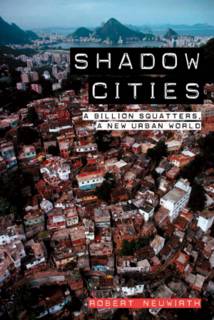 Here's a review of Robert Neuwirth's book Shadow Cities, A Billion Squatters, a New Urban World that I wrote a long time ago, but left to rot on my hard drive.
Here's a review of Robert Neuwirth's book Shadow Cities, A Billion Squatters, a New Urban World that I wrote a long time ago, but left to rot on my hard drive.
Imagine a third world shanty town and likely what you’ll think of is rampant crime and dire poverty; a place most of us would fear to tread. Robert Neuwirth, a reporter from New York City, spent two years living in four different squatter settlements. From the favellas of Rio de Janeiro to the corrugated metal shacks of Nairobi, continuing to Istanbul and Mumbai. His book examines the truth on the ground of shanty towns and the history of squatter communities.
In the shanties, Mr. Neuwirth does indeed find desperation and heavily armed drug gangs straight out of the film City of God. But, he also finds decent people struggling just to get by, facing complex economic and political obstacles with creativity and vitality.
Mr. Neuwirth meets hard-working people who have admirably provided for themselves rather than wait for government, society, or the official economy to provide for them. This, in fact, is the central theme of the book. For their independence and initiative, they are rewarded with perpetual risk of persecution and eviction.
The legal authorities are frequently no friend to the squatter, or the poor in general. In the town of Cuzco, Peru, unless things have changed since I was there, there is a statue outside the courthouse; a big black mountain lion, claws extended, fangs bared in an expression of menace. This is the image the Peruvian justice system presents to its people. In fact, the squatters of Neuwirth’s book fall frequently prey to the whims of government officials or real estate developers.
The legal limbo in which squatter communities exist is perilous, but not without advantages. The illegality of the squatter’s property serves to some extent as protection from confiscation by the authorities whether for taxation, dept repayment, or plain corruption. And many squatter communities happily pirate electricity and other utilities with relative impunity while they bootstrap themselves into modernity. Cottage industries thrive in the tax and regulation free environment of the unofficial settlements.
Being a software developer myself, the parallels between the squatters rebellion against legal barriers and the debate around intellectual property practically leapt out at me. We are in a period of enclosure of intellectual property similar to the fencing in of the great open spaces. Moneyed interests with allies in the legal system seek exclusive ownership rights. It might not be stretching the analogy too far to think of a shanty town as an open source city.
The economics of the unofficial economy and the interaction of wealth, power, and property rights are interesting and complex. Neuwirth’s book makes something of a hands-on companion to the theories of economist Hernando de Soto. Anyone with an interest in these subjects or a curiosity about the way of life in another world will enjoy Mr. Neuwirth’s book.
The vibrancy and ingenuity that Mr. Neuwirth finds in the slums contrasts vividly with the sanitized homogeneity of suburban consumer culture. It takes only a bit of imagination on the part of the reader to summon the sights and smells of the shanties; to visualize the gulf that divides their world from ours and the humanity that unites us.
Links
- Squatter City Neuwirth's blog
- Pic of rocinha stolen from here: Johnston Architects: Urban Squatting



No comments:
Post a Comment